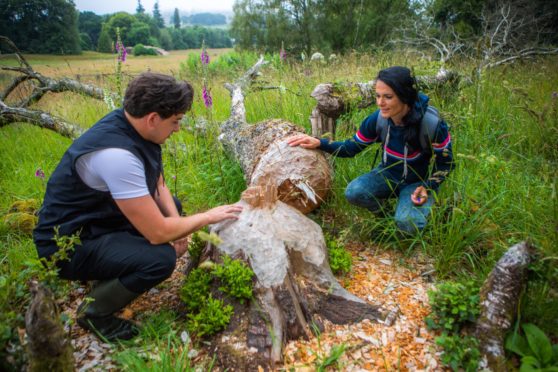NatureScot are hoping to employ the skills of a beaver management expert to help landowners in Scotland.
The Inverness-based nature agency said while it is initially looking for a person to advise people in Tayside, it wanted the service to be available at sites across the country.
NatureScot, formerly known as Scottish Natural Heritage, said the service would expand “as the need arises”, and as the beaver population in Scotland continues to grow.
What’s the job?
In tender documents published by NatureScot today, it said: “NatureScot is looking to continue and expand the beaver management advisory service we offer in Tayside and in other catchments as the need arises as beavers expand their range.
“We wish to establish a framework agreement with a number of suppliers that have the necessary skills and expertise to provide advice and to carry out a range of associated services; and to grow this expertise with a view to beaver mitigation becoming more established within recognised wildlife/land management approaches.
“It is anticipated that suppliers may be able to develop their skill sets via their involvement in this work.
“Suppliers may wish to tender for some or all aspects of this work either individually or working with others in order to offer the services detailed.”
New management approaches needed
It continued: “Clients needing advice might include land managers and owners, utility providers, local authorities and householders.
“The framework agreement will include a range of advisory and associated services to facilitate new management approaches which mitigate beaver impacts.”
The documents state that the key objectives of the role will be to advise NatureScot on techniques and options open to them to lawfully manage the impacts of beaver activity on their land.
New approaches to mitigate beaver impacts on land
NatureScot said it was particularly interested in techniques which are broader in application than traditional beaver mitigation i.e. tree wrapping and flow devices that are commonly used in wider land management approaches.
The tender document continued: “Following an agreed approach with the land manager and NatureScot, survey, report on and apply for funding where necessary to implement new management approaches which can mitigate beaver impacts.”
The advisor has to work to a two-day timescale for dealing with advice requests, with everything to be recorded on a “beaver casework report form”.
The tender documents continued: “The main purpose of this framework agreement is to provide site-specific advice to clients and NatureScot licensing and species advisors where beaver activities are impacting on human land use with a view to informing management changes.
“It is expected that most requests will relate to the Tayside (Tay, Earn, Isla) and Forth catchments, but there may be requests from elsewhere in Scotland as the population disperses and expands.”
Beavers are found in various locations throughout Scotland since their reintroduction to Knapdale, Mid Argyll in 2009.
In November 2021, NatureScot figures estimated there are between 602 to 1381 beavers in Scotland, across 254 beaver territories.
Protected species still being persecuted
The Eurasian beaver, which disappeared from Scotland’s lochs and rivers in the 16th century, became the first mammal ever officially reintroduced to the UK following a trial that ran in mid-Argyll from 2009-2014.
The population in Tayside, that resulted from unauthorised releases, has spread naturally into surrounding areas.
While their presence brings many environmental benefits, the animals can also cause problems with certain human land uses, especially in low-lying agricultural land.
In 2019 beavers were awarded European Protected Species status in Scotland, which made it illegal to carry out a range of activities, including lethal control of beavers and destroying established dams and lodges, without a licence.
87 Tayside beavers were shot under government license in 2019/2020 and another 115 in 2020/2021 despite estimates that there are over 105,000 hectares of “suitable beaver woodland habitat” all across Scotland.
A report by NatureScot said that Knapdale’s beavers have attracted visitors from around the world, bringing social and economic benefits to the area.
The closing date for interested parties is Wednesday January 19 at midday.
